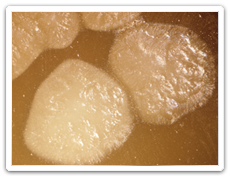Botulism (Clostridium botulinum)
 Clostridium botulinum (C. botulinum) is a bacteria that is commonly found in nature (in soil, on raw fruits and vegetables and on meat and fish). The bacteria produces botulinum toxin, a nerve poison, that can cause a rare but serious illness called botulism which can result in paralysis.
Clostridium botulinum (C. botulinum) is a bacteria that is commonly found in nature (in soil, on raw fruits and vegetables and on meat and fish). The bacteria produces botulinum toxin, a nerve poison, that can cause a rare but serious illness called botulism which can result in paralysis.
Image Content Provider: CDC/Dr. Holdeman
Symptoms
Symptoms generally appear 12 – 36 hours after eating or drinking food containing the bacteria and usually last two hours to 14 days. Symptoms can include nausea, diarrhea, fatigue, blurred vision, dry mouth, difficulty speaking and swallowing, descending paralysis of the arms, legs, trunk and breathing muscles. Death can result from respiratory failure.
Causes
Illness is caused by eating or drinking foods that are contaminated with the bacteria that produces the toxin. These foods are usually home-canned, low-acid foods that have been improperly processed. C. botulinum toxin is resistant to heat and thrives in a moist, oxygen-free environment. Improper home canning creates the perfect environment for botulism bacteria to grow and is the most likely risk for botulism.
Food contaminated by botulism may very well look and smell normal. Botulism cannot spread from person to person.
Treatment
Persons with botulism require immediate treatment. Treatment includes early doses of antitoxin and intensive respiratory care. Most people can recover if diagnosed and treated promptly.
Prevention
It is very important to follow strict food safety practices when canning low-acid foods at home. Home canning must be done properly and with care. Refrigerate all low-acid juices, such as carrot juice, and all other products that are labelled "keep refrigerated". Avoid feeding honey (even pasteurized) to children under one year old. Never eat food from dented, bulging or leaking home or store bought canned food. Store bought cans with bulging lids should be returned to where they were purchased. Foods with "off odours" should not be eaten or tasted. Food that has an unusual taste should not be eaten.
Manitoba Health Resources
For Health Care Providers
Product Monographs
The following are links to the product information leaflets for the products that Manitoba Health may have available. Please ensure the correct leaflet is reviewed based on the product received.
Other Resources
- Canadian Food Inspection Agency - Clostridium botulinum
- Public Health Agency of Canada - Clostridium botulinum
- BC Centre for Disease Control - Botulism
- Centers for Disease Control and Prevention - Botulism
Communicable Disease
Control (CDC) Health Links – Info Santé |



